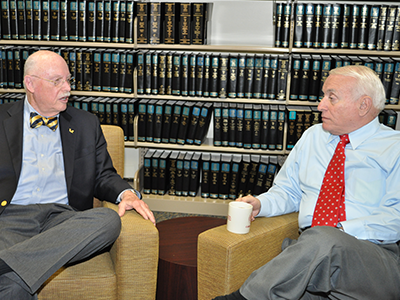Alumnus Honors Favorite Professor
"One of the enduring pleasures of teaching, especially teaching law, is watching your former students go on to succeed and prosper. Some become highly successful in their areas of practice, others become elected officials, some become judges, and a few become friends," says L. Lynn Hogue, professor of law emeritus about the announcement of the L. Lynn Hogue Professorship in Law. "From its beginning, Georgia State University College of Law has had a genuine commitment to diversity in the variety of students that we admit. However, we never really know everything that applicants bring with them, or how much law school will mean to them."
 Such was the case with Thomas J. Guzzo (J.D. '98), who transitioned from a military career into law school, thanks, he says, to Lynn Hogue.
Such was the case with Thomas J. Guzzo (J.D. '98), who transitioned from a military career into law school, thanks, he says, to Lynn Hogue.
"I was 45 years old and at a crossroads in my life. I could continue in the military and an assignment at the Pentagon, or I could prepare for another career," Guzzo says. "I always wanted to go to law school, but I worried that my undergraduate grades were nothing to brag about. Also, I was concerned that my military accomplishments and even the two masters degrees that I earned along the way might not carry much weight with the Admissions Committee."
"I learned about Georgia State University and contacted a friend in the Judge Advocate General Corps, who told me about Lynn Hogue, a JAG reserve officer, who taught at the College of Law," Guzzo says. "I asked for an introduction, met with Professor Hogue and realistically discussed my prospects for admission with him. He was supportive and helpful, and the next thing I knew I had an acceptance letter. Although he has minimized his involvement in my admission, I always knew he made a big difference."
Hogue says, "Tom brought some qualities to the law school that I think deserved my support. He had a soldier's tenacity, I knew he would not quit, and his grades were not that bad. He also had some values born of a military career that I thought would be valuable in law."
Four years later he graduated in the top half of his class, passed the bar exam on his first attempt, and began his second career in law. However, Guzzo never forgot Hogue, who became a close friend. When Hogue retired, Guzzo looked for a way to honor him and say thanks.
"I really did not know a meaningful way of saying thanks to a retiring law professor. A watch or a pen wouldn't do it," Guzzo says. "I kept hearing about scholarships, professorships and chairs, and that got me thinking. I came up with the idea of funding one of them for Professor Hogue, but I did not really understand how they were structured, or how the money is spent.
"Lynn explained that professorships and chairs were among the highest honors that could be bestowed on a professor. It seemed like a great way to express my appreciation for the way he and the college had changed my life," Guzzo says. "I asked for only two conditions. First, to the extent possible I wanted him to take ‘ownership' of it. I wanted him to be able to influence how the professorship would be used to promote the values he and I share and implement the interests he felt were important in legal education. And secondly, I wanted it named after him."
"I was honored," Hogue says, "and, it would be such a wonderful thing to do for the law school."
Hogue accepted the conditions and is excited by a chance to influence the way resources will be used. For example, he may encourage teaching and research in fields that comprised his career — Conflict of Laws, Military Law, National Security Law and Constitutional Law. The agreement creating the professorship includes a provision for a committee to advise in the recruitment of faculty members to hold it and a designated spot on that committee for Hogue as long as he is able to serve. The Board of Regents of the University System of Georgia approved the professorship at its November meeting.
Guzzo says, "This professorship provides Hogue a legacy that will allow his spirit and values, if not his person, to remain with the college in perpetuity, and, will serve as a constant reminder of how an alumnus found a way to express his appreciation for the teachings, guidance and friendship of his professor."